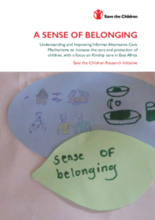Informal kinship care practices are widespread in the West Central Africa region. An estimated 15.8% of children in West Central Africa do not live with their biological parents. However, only a very small number (0.002%) live in formal alternative care (including residential care) while the majority live in informal care alternatives, especially with their extended family in kinship care. A regional Save the Children participatory research initiative 2012-2013 was undertaken to build knowledge on endogenous care practices within families and communities, especially informal kinship care, in order to better understand how the practice works and provide recommendations for programming to increase the care and protection of children. The research was conducted in the Democratic Republic of Congo, Nigeria and Sierra Leone with similar research underway at the time in Niger and planned for Senegal. This report entitled "Children Belong to Everyone" examines the findings from the research on the role and extent of kinship care in West Central Africa, as well as looking into program and policy implications and gaps in advocacy.
The research identifies key factors influencing kinship care arrangements in the 3 countries, including family poverty, the significance of local traditions, increasing value for education and lack of access to secondary schools, polygamy and family breakdown, accusation of witchcraft, conflict and displacement, outbreak of diseases including HIV/AIDs, and urbanization and migration. It also provides an overview of positive and negative experiences of children living in kinship care identified through the research. It finds that kinship care is a positive experience for some children enabling them to be cared for and loved by family members. Some children have increased access to education, health care and other resources when living with kin caregivers. However, for other children, kinship care is characterised by discrimination which can adversely affect their access to quality education, nutrition, protection and contributes to unfair distribution of household tasks. Some children also face stigma and discrimination in the wider community. In many scenarios the situation is complex where caregivers are striving to support kin children in their care, but financial struggles place constraints and stresses on the family.
Despite its prevalence, the report finds that informal kinship care remains neglected in terms of specific policies and programming needed to better support the care, protection and well-being of children. The informality and normality of kinship care contributes to its key strengths ensuring on-going kin ties and child rearing in family and community based settings for significant numbers of children, some of whom would otherwise require formal care. At the same time, that informality also contributes to a lack of regulation concerning the care, protection, and other rights of girls and boys living with kin caregivers. The report nonetheless recognizes that there are significant risks in formalizing kinship care, as this may prevent some caregivers from taking responsibility for their relatives’ children, as they may not want to engage in a bureaucratic process associated with formal care arrangements which they may perceive as invasive, time consuming and potentially expensive. In addition in many countries, given the overwhelming prevalence of kinship care, the Government child welfare system would also not be equipped to provide the support and follow up needed.
The report proposes 12 key areas for increased programming and advocacy based on research findings:
1) Improve data collection on kinship care; 2) Apply the Guidelines for the Alternative Care of Children to improve legislation policy and guidance on all forms of alternative care, recognising the significant importance of informal kinship care; 3) Increase child sensitive social protection, especially for vulnerable single parents and elderly caregivers; 4) Increase access to free primary and secondary education, especially in rural areas; 5) Increase budget for social services and social workers, and build the capacity of social workers; 6) Ensure better understanding of cultural practices to inform decision making in the best interests of the child; 7) Strengthen child protection systems, including informal mechanisms to increase oversight of informal kinship care; 8) Increase active participation of female and male caregivers, mothers, fathers and children in care decision making; 9) Increase opportunities for children’s participation in families, communities, practice and policy developments affecting them; 10) Address stigma and discrimination of children living in kinship care; 11) Increase positive parenting for fathers, mothers and diverse caregivers; and 12) Increase fathers and mothers on-going communication and responsibilities for child rearing.

